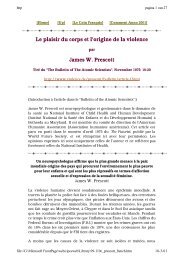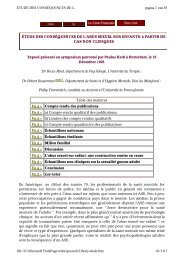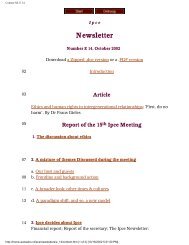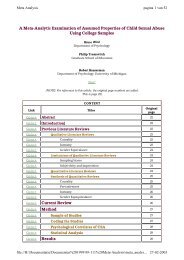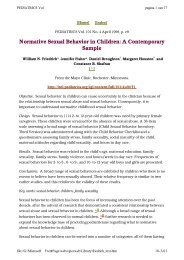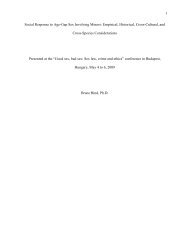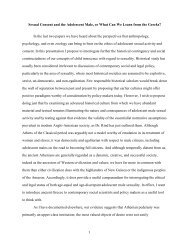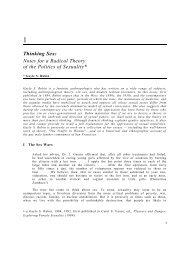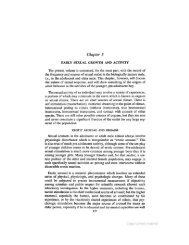Infant and Child Sexuality: A Sociological Perspective - Ipce
Infant and Child Sexuality: A Sociological Perspective - Ipce
Infant and Child Sexuality: A Sociological Perspective - Ipce
Create successful ePaper yourself
Turn your PDF publications into a flip-book with our unique Google optimized e-Paper software.
with me as I was with him, but he was usually<br />
willing. On this particular occasion, I imagine<br />
because my parents weren’t there to supervise,<br />
we had been playing with my brother’s penis<br />
while in the bathtub. When we got out of the<br />
tub, my brother said that his penis hurt, that<br />
it was sore. He wanted me to put a b<strong>and</strong>age on<br />
it. I did. He said that this made his penis feel<br />
so much better. I really couldn’t imagine how a<br />
b<strong>and</strong>age could help as his penis wasn’t bleeding.<br />
He said we’d have to do this again, but we never<br />
did. Actually, I received no sexual enjoyment<br />
out of fondling his penis, but I did think it<br />
was fun.<br />
All of the above cases involving a young child in a sexual encounter<br />
with a preadolescent or adolescent could be lumped under an emotionally-laden<br />
label--child molestation. But when we take a close look<br />
at the encounters we find that the content of the interaction is infinitely<br />
varied from case to case. To say that a preadolescent or adolescent<br />
is molesting a younger child is far too simple <strong>and</strong> categorical a<br />
way to deal with many of the experiences involved.<br />
Sexual Encounters With Parents In Early <strong>Child</strong>hood<br />
The <strong>Child</strong> as Audience <strong>and</strong> Parents as Sex Actors <strong>and</strong> Sex Models<br />
Before dealing with encounters involving child-parent interaction<br />
around the subject of sex, it is well to consider what the child has<br />
learned from observing his parents.<br />
There are societies, <strong>and</strong> the United States is not one of them, in<br />
which no effort or only limited effort is made to conceal parental sexual<br />
encounters from children. Among the Melanesian Isl<strong>and</strong>ers where a<br />
certain amount of parental privacy is considered desirable, if a child<br />
becomes too curious <strong>and</strong> bold it is told to mind its own business <strong>and</strong> is<br />
instructed not to look. (Brecher <strong>and</strong> Brecher, 1966, p. 188). But among<br />
the Alorese, by the age of five children are informed on details of the<br />
reproductive act. Members of the Pukapukan household sleep in the same<br />
room <strong>and</strong> although parents may wait until the children are asleep, there<br />
are opportunities for youngsters to observe adult sexual activity <strong>and</strong><br />
sexual matters are talked about. Lesu children are free to observe<br />
adult coitus with the exception that they are not to watch their own<br />
mothers having coitus. On Ponape children are given instruction in coitus<br />
from the fourth or fifth year. Trukese children receive no formal<br />
education but they learn by watching adults at night <strong>and</strong> by asking<br />
their elders about sexual matters. (Ford <strong>and</strong> Beach, 1951, p. 188-189).<br />
A high proportion of adults in the United States (the Kinsey sample)<br />
rather precisely recalled the age at which they had first seen the<br />
genitalia of the opposite sex. This, according to Kinsey, emphasizes<br />
the importance which such experience has for the child in a culture<br />
that has gone to such lengths to conceal the anatomic differences between<br />
the sexes. In searching for some characteristic trait that would<br />
distinguish the non-marital sexual behavior in primitive societies from<br />
other societies, Maxwell (1967) looked to differences in the structure<br />
49



